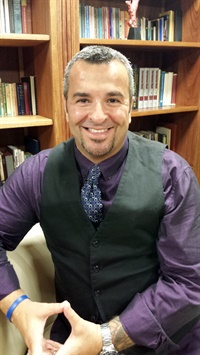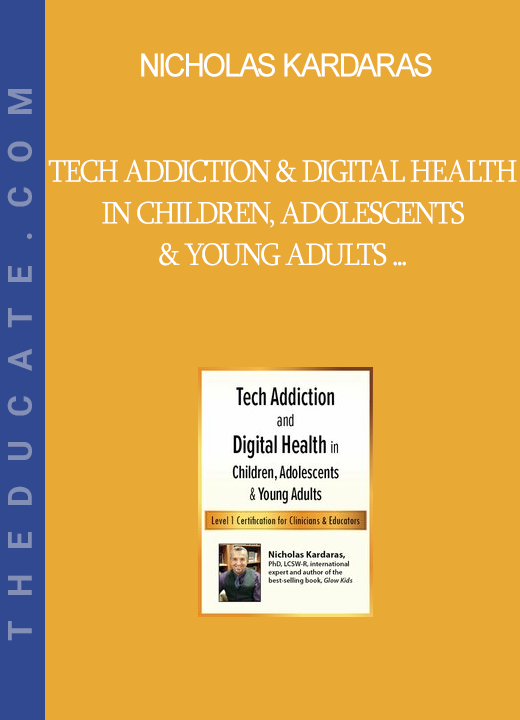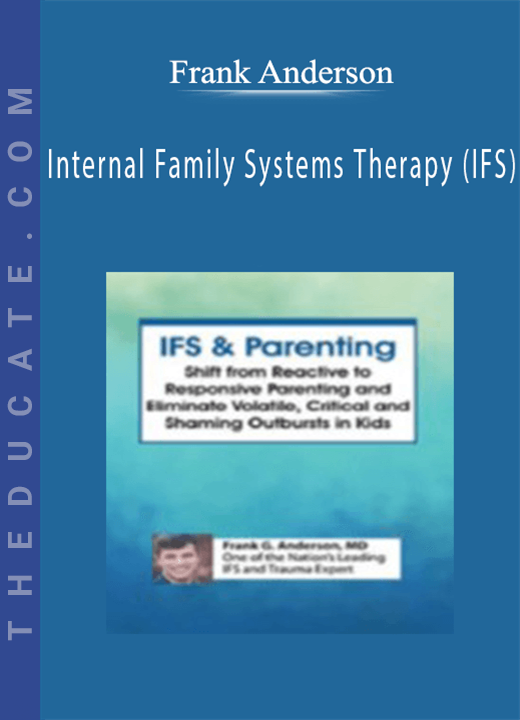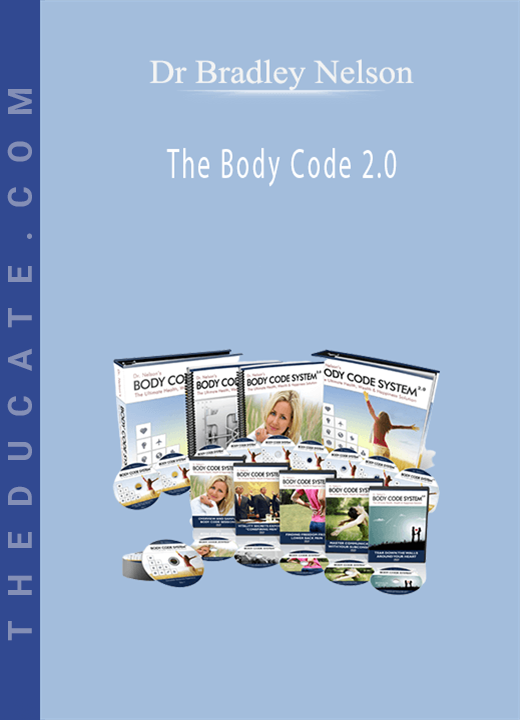Description
-
Nicholas Kardaras – Tech Addiction & Digital Health in Children, Adolescents & Young Adults – Level 1 Certification for Clinicians & Educators
- Faculty:
- Nicholas Kardaras
- Duration:
- 6 Hours 1 Minute
- Format:
- Audio and Video
- Copyright:
- Jun 23, 2020
- Clinical and school-based interventions for problem screen usage
- Safe and effective strategies to work with kids hijacked by tech addiction
- How family dynamics relate to problematic digital behaviors – and what you can do about it
- Proven interventions to reduce video gaming, social media, and YouTube obsessions
- Strategies to improve digital boundaries and discipline
- The origins of “Indoor Children”
- Difference between passive TV viewing and immersive/interactive modern screen experiences
- The role of dopamine in addiction
- The dopaminergic effects of screens on the brain
- A view of screens as “digital drugs”
- Brain imaging research and the effects on the frontal cortex
- Hormonal impacts of tech overuse
- Depression and social media
- ADHD and screen-time
- Anxiety and screen-time
- Thought disorders and video games as well as “sensory overload”
- Increased aggression and video games
- Limitations of the research and potential risks
- Assessment tools
- The difference between “overuse” and “addiction”
- A comparison with substance addiction assessment
- Not all tech addiction is the same
- Specific digital usage problem, stressors, triggers
- Underlying and co-morbid issues
- Residential vs. outpatient treatment: Pros and cons
- How to implement a “Digital Detox”
- Importance of nature, meditation and exercise
- Research on educational outcomes of classroom technology
- Phones in the classroom and standardized test scores
- Screens in the classroom and impact on reading and comprehension
- Comparisons of “Low Tech” schools and one-to-one screen schools
- Ed Tech: a $60 billion annual industry
- The Los Angeles “iPad Fiasco” and the Amplify initiative by Rupert Murdoch
- Validate that the issues harming families are indeed real
- Address dysfunction contributing to the problem
- Family psychoeducation
- ”Family Intervention Plan”: The solution needs to be a collective one
- Individualized digital “re-entry” plan: Hands-on activity
- Help the child to identify healthier “Digital Vegetables” vs. “Digital Candy”
- Measure progress and what to do if there is a setback
- Learn interventions and strategies to handle:
- Mood-dysregulated 13 year old male, Dx Intermittent Explosive Disorder (IED)
- Violent adolescent male, Dx ADHD and conduct disorder, video gamer, school refusal, assaults parents
- Suicidal adolescent female, Dx depression, disordered eating and self-injurious behavior, social media platforms 8-10 hrs a day
- Twenty-five-year-old graduate student, very politically-interested, stays up all night “hyper-link” surfing, hears voices, paranoid
- Social-media obsessed mom, neglects young children, marriage is suffering, children acting out
Description
We are on the verge of a global public health crisis – and the kids, teens and young adults you work with are at the greatest risk.
Young people are living their lives in front of a screen with disastrous results. ADHD, depression, suicidality, anxiety, sleep irregularities, thought disorders, and stunted social skills are rising dramatically. Whether you’re a mental health professional or school-based professional the resources available have lacked the concrete strategies and real-life interventions you need to effectively intervene in this growing epidemic.
Dr. Nicholas Kardaras is an internationally renowned expert on tech addition, author of the best-selling book Glow Kids, and executive director of one of the world’s top rehabs, The Dunes in East Hampton, NY. He is an active advocate for screen addiction to be included as a clinical disorder.
Learn from him in this Certification training and get the most effective tools, strategies and techniques you need to help children, adolescents, young adults and families hijacked by technology overuse.
Discover:
Best of all, completion of this training meets the educational requirements should you choose to apply to become a Certified Digital Health and Wellness Level 1 Professional (CDHWP) through the National Institute for Digital Health and Wellness (NIDHW). To learn more about how you can apply for CDHWP certification and distinguish yourself from other professionals, visit https://www.nidhw.org./
Purchase today and finish feeling prepared and confident in your ability to lead young people hijacked by tech overuse on the path to a better life!
Handouts
| Manual – Tech Addiction and Digital Health in Children, Adolescents & Young Adults (14.1 MB) | 61 Pages | Available after Purchase |
Outline
The Origins of Screen Culture
Neurological Impacts of Technology Overuse
Clinical Research: Technology Overuse Impact On:
Assessments and Observational Tools
Treatment Interventions for Tech Overuse
Technology in the Classroom: Pedagogical Impacts of Screen Time
Working with Families and the Family Dynamic
”Mindful Digital Usage”: How to Reintegrate Back into Healthy Tech Usage
Case Study Review
Faculty

Nicholas Kardaras, Ph.D., LCSW-R Related seminars and products: 5
Nicholas Kardaras, PhD, LCSW-R, is a psychologist, best-selling author, internationally renowned speaker and expert on mental health, addiction, and the impact of our digital age. He has developed clinical treatment programs all over the country and is the founder and chief clinical officer of Maui Recovery in Hawaii, Omega Recovery in Austin, and the Launch House in New York.
Dr. Kardaras is a former clinical professor at Stony Brook Medicine where he specialized in teaching the neurophysiology and treatment of addiction. He has also taught neuropsychology at the doctoral-level and has worked closely in developing clinical protocols with Dr. Howard Shaffer, associate professor at Harvard Medical School and the director of their Division of Addiction.
Dr. Kardaras has written for TIME magazine, Scientific American, Psychology Today, Salon, the NY Daily News, and FOX News, and has appeared on ABC’s 20/20, Good Morning America, the CBS Evening News, FOX & Friends, NPR, Good Day New York and in Esquire, New York magazine and Vanity Fair. He was featured on the 2019 A&E TV series Digital Addiction and his 2016 NY Post Op Ed “Digital Heroin” went viral with over six million views and shares.
Dr. Kardaras is the author of the best-selling Glow Kids (St. Martin’s Press, 2016, now translated into 10 languages), the seminal book on the clinical, neurological and sociological aspects of technology addiction. He is the author of How Plato and Pythagoras Can Save Your Life (Conari, 2011) and often uses philosophy to help work with and treat young people who are struggling with an existential crisis.
Considered a leading expert on young people and digital addiction, he has clinically worked with over 2,000 teens and young adults over the last 18 years and has been active in advocating that screen addiction be recognized as a clinical disorder akin to substance addiction. As a result of his clinical training and expertise working with tech addiction, Dr. Kardaras has developed the most comprehensive treatment protocols to treat this emerging global problem. Dr. Kardaras is also a founding charter member of the not-for-profit National Institute for Digital Health and Wellness (NIDHW), which is an affiliate organization of the National Institute for Science, Law and Public Policy (NISLAPP) in Washington, D.C.
Speaker Disclosures:
Financial: Nicholas Kardaras maintains a private practice. He is the CEO/Chief Clinical Officer for Omega Healthcare Group. Dr. Kardaras receives a speaking honorarium from PESI, Inc.
Non-financial: Nicholas Kardaras sits as a board member for the National Institute of Digital Health






Reviews
There are no reviews yet.